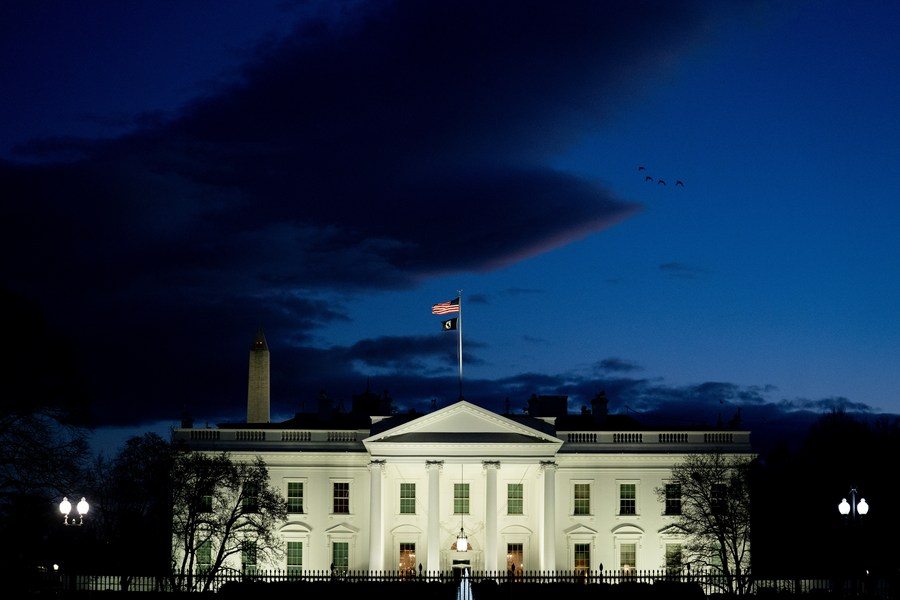
Protesters gather during the anti-war demonstration in Washington, D.C., the United States, March 18, 2023. (Xinhua/Liu Jie)
"The invasion of Iraq was twenty years ago, but the U.S. government hasn't learned a single lesson," said American journalist and activist Eugene Puryear, also an organizer of Saturday's anti-war rally north of the White House.
WASHINGTON, March 19 (Xinhua) -- Hundreds of protesters gathered outside the White House in Washington, D.C. on Saturday afternoon to demand a stop to endless U.S. wars and the "War Machine," two days before the 20th anniversary of the U.S.-led invasion of Iraq.
The anti-war demonstration was the second of its kind in the American capital in less than a month.
"It's just a terrible mistake," Claudia Lefko, a protester from Northampton, Massachusetts, told Xinhua when asked to comment on the Iraq War. "The country is a ruin. We've destroyed it ... The Iraqis are still suffering the consequences."
"We started to attack a country already destroyed by years of sanctions," Lefko continued. "There was no work. There was no infrastructure. The country was already destroyed, and we just put it further into the ground."
On March 20, 2003, the United States and some of its allies launched a bombing campaign in Iraq under the false claim that the country was manufacturing weapons of mass destruction (WMD).
The Iraq War not only caused hundreds of thousands of deaths, extensive destruction and political turmoil in Iraq, but also resulted in the increase of sectarian politics and widespread violence in the country, as well as the rise of the Islamic State militant group which has been launching terror attacks throughout the Middle East, a study by the Costs of War project at Brown University showed.
The eight-year war cost the United States nearly 2 trillion dollars and the lives of more than 4,000 troops, and caused the country's polarization to gather pace.
"There are strong connections between the decision to invade Iraq and the structural divide in U.S. politics," Molly Reynolds, a senior fellow in Governance Studies at the Brookings Institution, remarked on Friday during a seminar at the Washington, D.C.-based think tank.
While Saddam Hussein's government was overthrown, no stockpiles of WMDs or active WMD programs were ever found in Iraq.
"The principal reason for invading Iraq, that Saddam had WMD, was wrong," late U.S. Senator John McCain wrote in a book published in 2018. "The war, with its cost in lives and treasure and security, can't be judged as anything other than a mistake, a very serious one."

Abdullah Ibrahim shows a photo of his house destroyed by a reckless U.S. missile, which also left him disabled, in Salahudin province, Iraq, Jan. 4, 2022. (Xinhua)
American journalist and activist Eugene Puryear, also an organizer of Saturday's anti-war rally north of the White House, said that "the invasion of Iraq was twenty years ago, but the U.S. government hasn't learned a single lesson."
"The American public was told that Iraq had weapons of mass destruction, but that was a complete lie with no evidence," Puryear underlined. "Now we're being lied to again. We must put a stop to endless war."
A student in Williamsburg, Virginia, who described himself as Esteban to Xinhua, opined that the Iraq War is only part of "a long history of the United States invading, bombing, meddling with other countries."
"It was a horrible tragedy," Esteban said. "We destabilized the entire region all for profit. It was based on a lie."
Similar demonstrations were held in some other cities in the United States as anti-war protesters and activists have ratcheted up criticism of the U.S. role in the Russia-Ukraine conflict, which escalated more than a year ago.
"We must have a negotiated settlement to this war," Washington, D.C., resident Bob told Xinhua. "A negotiated settlement is something we have to talk about now, and get it done."
The "immediate problem" is that the U.S. government "does not want to negotiate a settlement," Bob said, adding that Washington is "driving and pushing this war, even though we won't say that publicly."

This photo taken on Jan. 20, 2023 shows the White House in Washington, D.C., the United States. (Xinhua/Liu Jie)
U.S. President Joe Biden announced his budget proposal for the fiscal year 2024 earlier this month, which includes 886 billion U.S. dollars for military and defense activities. The Pentagon's spending would surge to 842 billion dollars, a 26-billion-dollar or 3.2-percent increase from the fiscal year 2023 enacted level.
The budget "continues support for Ukraine, the United States' strong alliance with the states of the North Atlantic Treaty Organization (NATO), and other European partner states by prioritizing funding to enhance the capabilities and readiness of U.S. forces, NATO allies, and regional partners," the White House said about the proposed military spending.
William Hartung, a senior research fellow at the Quincy Institute for Responsible Statecraft, a Washington, D.C.-based think tank, wrote in an analysis that "the proposed budget is far more than is needed to provide an effective defense of the United States and its allies."
"As military spending soars towards 1 trillion U.S. dollars a year, it is long past time for Congress to take a critical look at the Pentagon budget with an eye towards aligning it with a reasonable defense strategy, rather than piling on weapons we don't need based on pork-barrel politics rather than strategic necessity," Hartung pointed out.
On Saturday, protesters urged the U.S. government to "fund people's needs" instead of the "War Machine," given that American families and consumers are still struggling to address high inflation amid a banking crisis that has rekindled fear of an economic recession.
"The military budget is way too high," Bob argued. "We don't need this. We don't need this kind of spending on war. We have people camped out around this city who don't have a home. They're living in tents."
Lefko agreed, labeling the United States as "a war-mongering country" that "should cut the military budget" because "security is food for people and housing for people." ■












